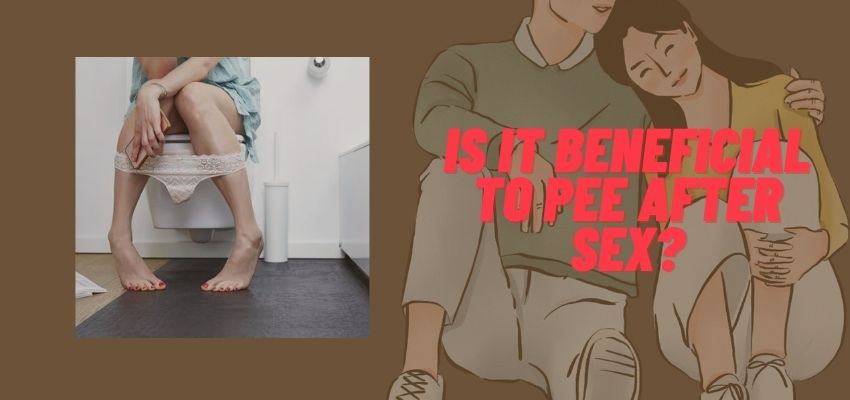In this article, we will discuss Is It Beneficial To Pee After Sex? Should both men and women have to pee just After sex? What Happens if they don’t go for pee Immediately?
It is not necessary to urinate after sex, but doing so can be beneficial. Doing so may help prevent urethral infections.
A urethral infection occurs when bacteria enter your urethra, usually by reaching your bladder through your urethra (the opening where urine passes).
If you’re a woman, your urethra is closer to your vaginal opening.
If you’re a man, your urethra releases both urine and semen – though not at the same time.
Therefore, urinating after sex can help flush out any bacteria that may have entered your urethra due to sex. While this is not a 100% effective way of preventing sex-related urinary tract infections, it can reduce the chances.
Is It Beneficial To Pee After Sex for both men and women?
Peeing after sex isn’t a bad idea, but some people may be more likely to get a urinary tract infection from it.
If you’re a woman and you get frequent or easy urinary tract infections, you may benefit most from urinating after sex. In women, the passage from the urethra to the bladder is shorter, so bacteria do not have to travel as far to cause an infection.
Although peeing after sex is not as important if you don’t get frequent infections even if you’re a woman, it’s a good habit to get into and may benefit you in the future.
Urinating after sex is the least beneficial for men, as their urethral canal is much longer. So bacteria have to travel a long way to cause infection.
What if I haven’t had penis-in-vagina sex?
If you haven’t had penile-vaginal sex, you’re safe. You can touch anywhere on the vulva without worrying about increasing your risk of urethral infection.
There is an exception, however, if a man performs oral sex on his female partner’s vagina, or stimulates the clitoris with the tongue, bacteria can pass from the mouth and tongue into the urethra.
How soon should you pee?
Ideally, you should urinate within 30 minutes after having sex to reap the benefits of urethral infection prevention. However, the sooner you do, the better.
Can it help prevent pregnancy?
Peeing will not prevent pregnancy – even if you pee a few seconds after ejaculation is released.
During penile-vaginal intercourse, semen is released into the vaginal canal, which is a separate orifice. In other words, when a woman urinates through her urethra, nothing will come out of her vagina.
So once semen enters the vagina, there is no way to get it back out. Soon after ejaculation, the sperm begin their journey toward the uterus to try to fertilize the egg.
What if you are trying to conceive?
When you’re trying to get pregnant, some medical experts recommend lying down for a few minutes after sex rather than getting up immediately. Because it is believed that it may help ease the passage of sperm traveling toward the uterus.
However, most effective swimmers are already active sperm, whose journey is not affected by whether or not you are lying down.
So even if you get up to pee right after sex, your chances of getting pregnant are not affected.
But does it really prevent urinary tract infections?
The simple answer is – we don’t know for sure whether it will work or not. But there is no harm in trying it.
There hasn’t been much research to establish a precise relationship between urinary tract infections and the effectiveness of urinating after sex.
There are many other factors that play a role in developing a urethral infection, including how much water you drink and how much urine you normally pass. That’s why scientists find it difficult to find out its exact factor.
Can it also protect against sexually transmitted infections or other infections?
Peeing after sex can help flush out bacteria that cause urethral infections, but it won’t protect you from sexually transmitted infections.
You pee after sex to remove bacteria from inside your urethra.
But the bacteria associated with sexually transmitted diseases affect the body differently. Your body can absorb bacteria through tiny holes in the mucus membrane. Urination will not affect this absorption process.
The only way to reduce the risk of sexually transmitted infections is to use a condom every time you engage in sexual activity. Also, getting regular checkups can help in detecting the infection early and getting proper treatment.
What if I can’t pass urine?
If you don’t feel like urinating after sex, but you want to, the following steps may help:
- drink more water. The more you drink, the more your bladder expands. The more it stretches, the more likely you are to feel the urge to urinate. Drinking half or a full glass of water before sex can help you urinate after sex.
- Use audio or video prompts. For example, seeing or hearing running water can help stimulate your bladder.
- Sit in the bathroom for a few extra minutes. Taking a few extra moments to urinate can encourage your bladder to relax and release its contents.
What if I don’t pee after sex?
If you don’t or can’t urinate after sex, it’s no big deal. This is just an easy way to reduce the chances of a urinary tract infection
Holding in your urine for too long at any time – after sex or anytime – can increase your risk of getting a urinary tract infection.
If you develop frequent urethral infections, make an appointment with your doctor or another healthcare provider. He may be able to prescribe you antibiotics or other preventive medicine.
conclusion
Peeing after sex can help reduce your risk of a urinary tract infection. Pair this with proper hydration (drinking regular water) and regular urination, and your risk may drop even further.


